


 Over the past few years the Chief Prosecutor’s Office expanded its staff and greatly increased its payroll.
Over the past few years the Chief Prosecutor’s Office expanded its staff and greatly increased its payroll.
Author: Goga Tushurashvili
On March 26, 2016, IDFI sent freedom of information letters to Georgia’s Chief Prosecutor’s Office requesting public information on its administrative expenses. The Prosecutor’s Office took one month to gather the data and partially satisfied our request on May 6.
The following is an overview of the data on the 2011-2015 administrative expenses disclosed by the Prosecutor’s Office.
Staff
After the parliamentary elections, the newly elected government frequently spoke about the overwhelming number of appeals/applications being received by the Prosecutor's Office. According to official data, from October 2012 to January 2015, the Prosecutor's Office received 52,530 citizen appeals/applications on cases related to public servant misconduct. In order to process the sudden influx of appeals the Prosecutor's Office decided to expand its staff. As of December 31, 2011, the Prosecutor’s Office had 604 employees. By 2015, this number had increased to 772 (see Figure 1).
The Prosecutor’s Office increased the number of its supernumerary employees as well from 22 in 2011 to 42 in 2015 (see Figure 1), and dismissed a few dozen staff members each year (most – 88 in 2012) most often based on a personal application (see Figure 2).
Figure 1 - Employees of the Chief Prosecutor's Office (2011-2015)
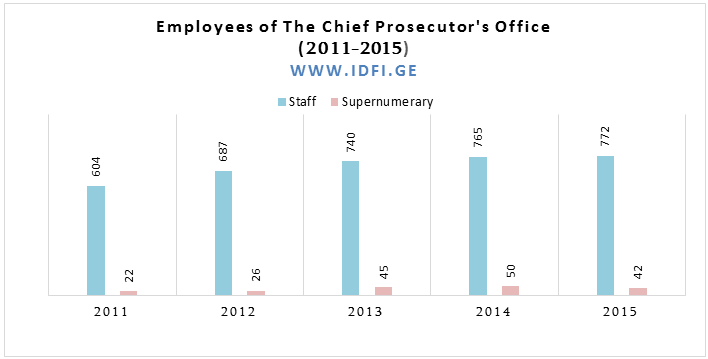
Figure 2 - Employees Dismissed from the Chief Prosecutor’s Office

Payroll
Since 2012, together with the expansion of the staff, the Prosecutor’s Office also increased its payroll. However, the latter increased considerably faster than the former. The number of staff increased by 27.8% from December 31, 2011 to December 31, 2015, while total payroll increased by 69.1% from 2012 to 2015.
Total staff payroll of the Prosecutor's Office by year (see Figure 3):
• 2011 – GEL 14,540,949
• 2012 – GEL 15,214,572
• 2013 – GEL 20,108,742
• 2014 – GEL 24,743,192
• 2015 – GEL 25,720,900
The increase in payroll is largely due to the increase in the amount of bonuses and salary supplements being issued by the Prosecutor’s Office to its employees (see Figure 4). Prior to 2014, employees received only bonuses as additional compensation. In 2014, bonuses (GEL 6,283,579) were joined by salary supplements (GEL 3,960,116) for a total of GEL 10,243,695 of remuneration on top of the regular salary. In 2015, even though the total amount of bonuses decreased by GEL 3,478,539, supplements increased by GEL 3,854,353, resulting in an overall increase to additional compensation (GEL 10,619,509) compared to the previous year.
The 2016 budget of the Prosecutor's Office includes bonuses of GEL 2,721,000 and salary supplements of GEL 5,164,500.
Remuneration for the supernumerary staff has also increased. In 2011-2013 supernumerary employees received only salaries as remuneration. In 2014, they started receiving bonuses as well (GEL 100,275), and in 2015 salary supplements were also added (GEL 4,250).
Figure 3 - Remuneration of the Chief Prosecutor’s Office Staff
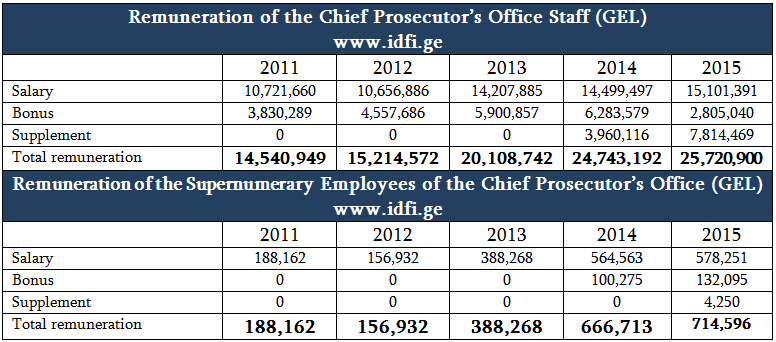
Figure 4 – Bonuses and Salary Supplements Issued by the Chief Prosecutor’s Office
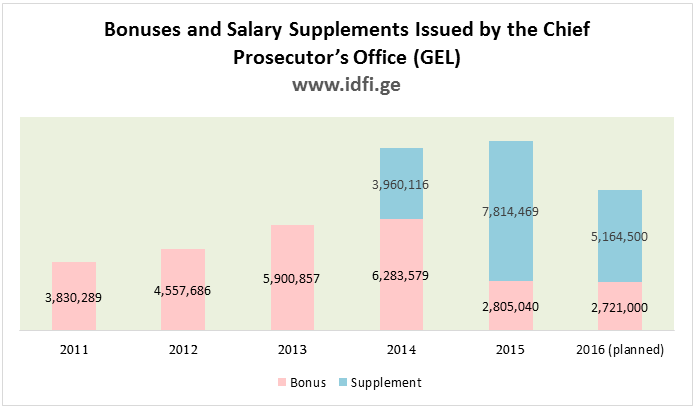
IDFI also requested the Prosecutor's Office to disclose information about bonuses and supplements received by its high ranking officials separately. Unfortunately, the Prosecutor's Office refrains from disclosing this information.
An analysis of asset declarations filed by public officials to the Civil Service Bureau revealed that former chief prosecutor Giorgi Badashvili had received total remuneration of GEL 107,580 in 2015 (January-June). The monthly salary of the chief prosecutor is GEL 3,910 (or GEL 43,010 for 11 months in 2015), suggesting that Badasvili received GEL 64,570 in bonuses and supplements (see Figure 5).
The current chief prosecutor Irakli Shotadze receieved GEL 113,070 in 2015, when he served as first deputy prosecutor for the first 11 months of the year and as the new chief prosecutor since December 2015. The salary of the first deputy prosecutor is GEL 3,520, suggesting that Shotadze GEL 70,440 in bonuses and supplements in 2015. Remunerations received by deputy chief prosecutors include similar proportions of bonuses and supplements (see Figure 5).
The practice of high ranking officials at the Chief Prosecutor’s Office receiving higher bonuses and supplements compared to their salaries is a long running one. For example, chief prosecutor Malkhaz Zodelava received GEL 70,440 in bonuses out of his total remuneration of 117,360 in 2011, and chief prosecutor Archil Kbilashvili received GEL 67,014 in bonuses out of GEL 107,026 in 2013 (January 1 -7 November).
Figure 5 - Remuneration of the Chief Prosecutor and Deputy Chief Prosecutors in 2014-2015

Source: declaration.gov.ge
Official Visit and Representation Expenses
Over the last 5 years, the Prosecutor’s Office spent the most on official visits in 2014 – GEL 161,794, which is twice as much as was spent in 2011 and 2013 and three times as much as in 2012. (see Figure 6).
Figure 6 - Official Visit Expenses of the Chief Prosecutor's Office
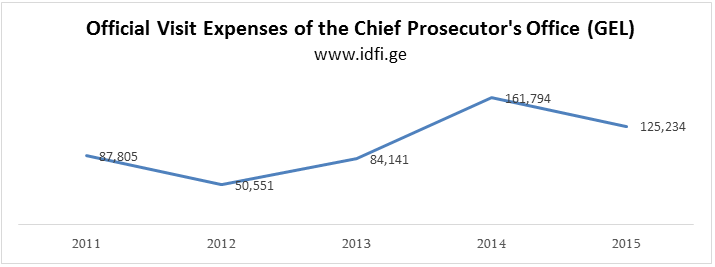
2014 was also the year with the most representation expenses – GEL 199,177 (see Figure 7).
Figure 7 - Representation Expenses of the Chief Prosecutor's Office
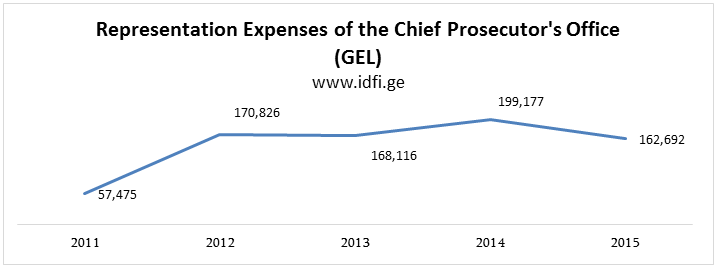
Communication Expenses
The Prosecutor’s Office does not hold information about its communication expenses for 2011 and 2012, since these expenses were being covered by the Ministry of Justice. Since then, telephone expenses of the Prosecutor's Office have been gradually increasing from GEL 159,649 in 2013 to GEL 176,175 in 2015 (see Figure 8). Roaming expenses are the exception, and have decreased from GEL 23,661 in 2013 to GEL 11,936 in 2015.
Figure 8 - Communication Expenses of the Chief Prosecutor's Office
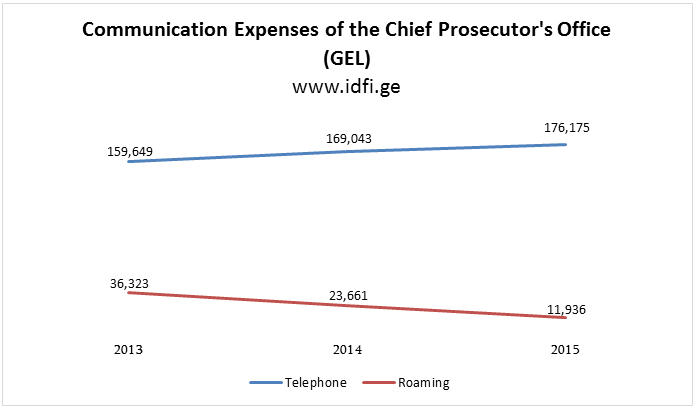
Vehicle Fleet
As of May 2016, the Prosecutor's Office has 152 vehicles, with a total market value of GEL 6,286,285 GEL, and residual value of GEL 3,341,798. In 2013, the Prosecutor's Office spent GEL 1,599,089 on purchasing vehicles (see Figure 9).
Figure 9 - Vehicle Expenditures of the Chief Prosecutor's Office
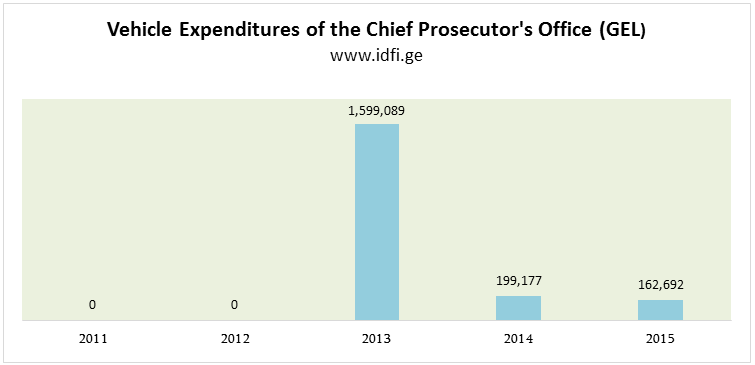
The Prosecutor’s Office also possessed a number of expensive vehicles it either purchased or received since 2011 (see Figure 10).
Figure 10 - Most Expensive Vehicles Purchased or Registered by the Chief Prosecutor’s Office

As with communication expenses, the Prosecutor’s Office does not hold information about its gasoline expenses for 2011 and 2012, since these expenses were being covered by the Ministry of Justice. Gasoline expenses were highest in 2014 – GEL 1,741,513 (see Figure 11).
Figure 11 - Gasoline Expenses of the Chief Prosecutor's Office
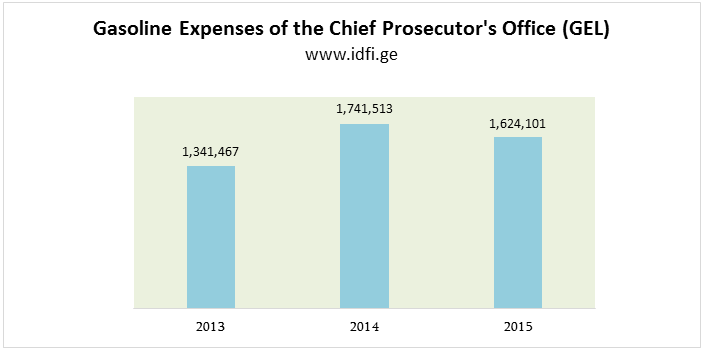
Conclusion
The information disclosed by the Chief Prosecutor's Office reveals an increase in the number of overall staff since 2012 and an even greater increase in the total payroll and administrative expenses in general.
We urge the Prosecutor’s Office to take greater effort in proactively publishing information that would dispel any doubts about the efficiency of its work and the necessity of increased administrative expenses.
Unfortunately, the Prosecutor's Office currently fails to ensure adequate transparency of its work. To remedy this problem, the Prosecutor’s Office should disclose information about the fate of 52,530 citizen appeals on public servant misconduct it received after 2012 elections.